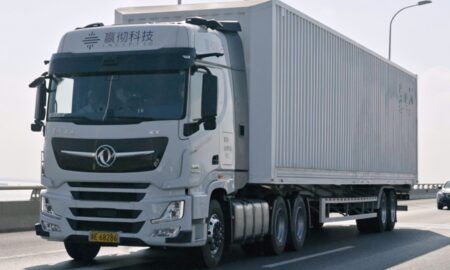Nvidia has unveiled the world’s first artificial intelligence (AI) computer designed to drive fully autonomous robotaxis capable of ‘reshaping the future of society’.
The new system, codenamed Pegasus, extends the Nvidia Drive PX AI computing platform to handle SAE Level 5 driverless vehicles. Nvidia Drive PX Pegasus delivers over 320 trillion operations per second; this is more than 10 times the performance of its predecessor, Nvidia Drive PX 2.
Nvidia said Drive PX Pegasus will help make possible a new class of fully autonomous vehicles that can operate without a driver, without steering wheels, pedals or mirrors. They will arrive ‘on-demand’ to safely carry passengers to their destinations, bringing mobility to everyone, including the elderly and disabled.
Of the 225 partners currently using the Drive PX platform, more than 25 are developing fully autonomous robotaxis using Nvidia CUDA GPUs. Their trunks resemble small data centers, loaded with racks of computers with server-class Nvidia GPUs running deep learning, computer vision and parallel computing algorithms.
However, their size, power demands and cost make them impractical for production vehicles. The computational requirements of full-autonomy are enormous: perceiving the world through high-resolution, 360° surround cameras and lidars; positioning the vehicle with centimeter accuracy; tracking vehicles and people around the car; and planning a safe path to the destination. The computing demands of driverless vehicles are easily 50 to 100 times more intensive than the most advanced cars today.
The Drive PX Pegasus is powered by four high-performance AI processors. It couples two of Nvidia’s newest Xavier system-on-a-chip processors, featuring an embedded GPU (graphics processing unit) based on the Nvidia Volta architecture, with two next-generation discrete GPUs with hardware created for accelerating deep learning and computer vision algorithms.
The system will provide the enormous computational capability for fully autonomous vehicles in a computer the size of a license plate, drastically reducing energy consumption and cost.
“Creating a fully self-driving car is one of society’s most important endeavors; and it is one of the most challenging to deliver,” said Jensen Huang (above), Nvidia founder and CEO. “The breakthrough AI computing performance and efficiency of Pegasus is crucial for the industry to realize this vision.
“Driverless cars will enable new ridesharing and carsharing services. New types of cars will be invented, resembling offices, living rooms or hotel rooms on wheels. Travelers will simply order up the type of vehicle they want, based on their destination and activities planned along the way. The future of society will be reshaped.”




